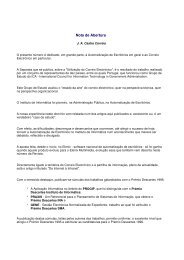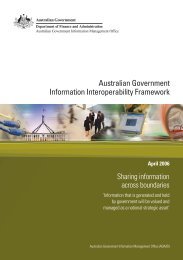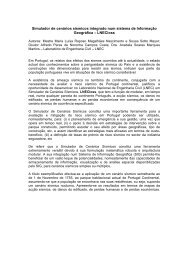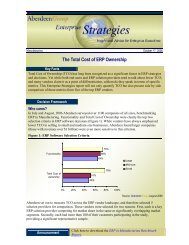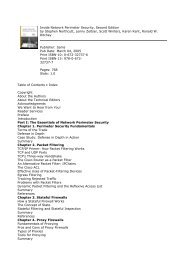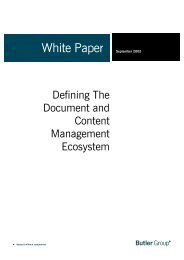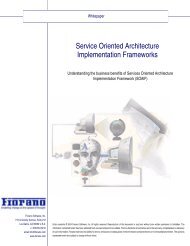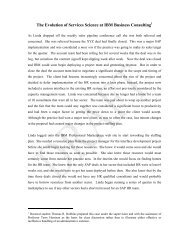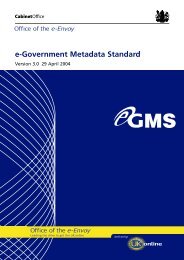OECD Peer Review of E-Government in Denmark - ePractice.eu
OECD Peer Review of E-Government in Denmark - ePractice.eu
OECD Peer Review of E-Government in Denmark - ePractice.eu
You also want an ePaper? Increase the reach of your titles
YUMPU automatically turns print PDFs into web optimized ePapers that Google loves.
VI.<br />
COMMON FRAMEWORKS AND COLLABORATION<br />
Collaboration between government organisations is both a key requirement and significant<br />
challenge for the development <strong>of</strong> efficient and effective e-government <strong>in</strong> all <strong>OECD</strong> countries. Without<br />
collaboration, some <strong>of</strong> the most important results that governments are seek<strong>in</strong>g through e-government<br />
simply cannot be achieved. This chapter looks at the steps <strong>Denmark</strong> has taken to facilitate<br />
collaboration on e-government, especially through co-ord<strong>in</strong>ation efforts and development <strong>of</strong> common<br />
frameworks to support collaborative action.<br />
Collaboration is relatively well advanced <strong>in</strong> <strong>Denmark</strong>. Interviews with <strong>of</strong>ficials revealed a strong<br />
commitment to the concept and practice <strong>of</strong> collaboration, and general satisfaction with the way the<br />
policy and operational environments support this behaviour. This attitude was reflected <strong>in</strong> the <strong>OECD</strong><br />
survey; when asked about potential challenges to their implementation <strong>of</strong> e-government, only 31% <strong>of</strong><br />
respondents stated that difficulty <strong>in</strong> collaboration was a challenge <strong>of</strong> any importance, with less than<br />
1% say<strong>in</strong>g it was very important. This is a positive result that appears to reflect <strong>Denmark</strong>’s public<br />
sector culture <strong>of</strong> consensus and compromise act<strong>in</strong>g <strong>in</strong> support <strong>of</strong> e-government.<br />
Figure 6.1 Importance <strong>of</strong> potential challenges to e-government implementation<br />
External barriers (e.g. legislative/regulatory, budgetary, digital divide)<br />
Competition for resources<br />
Lack <strong>of</strong> plann<strong>in</strong>g with<strong>in</strong> your organisation<br />
Lack <strong>of</strong> skills <strong>in</strong> your organisation<br />
Management <strong>of</strong> technology<br />
Unclear costs and benefits <strong>of</strong> e-government<br />
Resistance to organisational change<br />
Difficulty <strong>of</strong> design<strong>in</strong>g customer-focused services<br />
Lack <strong>of</strong> political leadership<br />
Privacy and security concerns<br />
Unclear def<strong>in</strong>ition <strong>of</strong> <strong>in</strong>stitutional responsibilities for e-government<br />
Unclear accountability<br />
Duplication <strong>of</strong> actors at e-government policy-sett<strong>in</strong>g level<br />
Difficulty <strong>of</strong> collaborat<strong>in</strong>g with other organisations<br />
0% 20% 40% 60% 80% 100%<br />
Very important challenge Important challenge Somewhat important challenge Not an important challenge Not a challenge (has % been mastered) Not a relevant challenge<br />
Source: <strong>OECD</strong> E-<strong>Government</strong> Survey: <strong>Denmark</strong>.<br />
89



